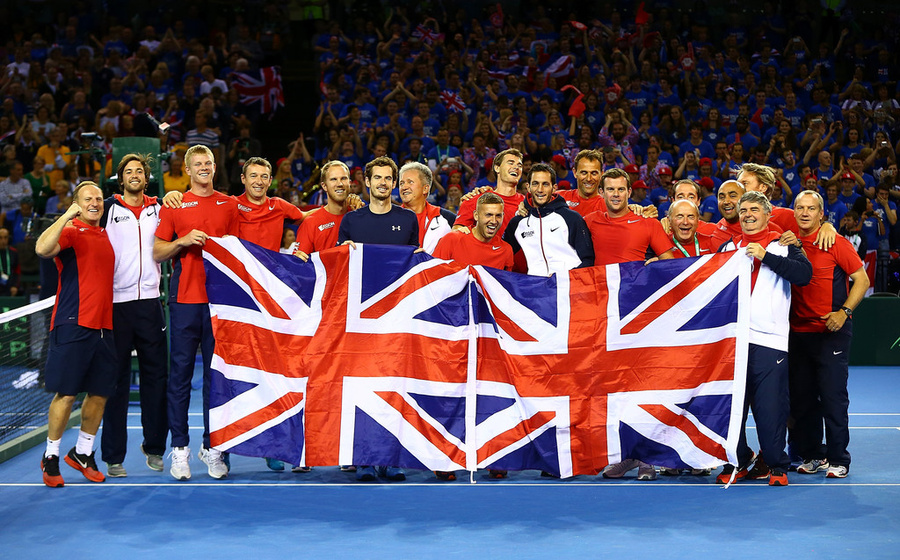Don't miss any stories → Follow Tennis View
FollowAndy Murray and the Davis Cup Controversy
Change is inevitable. Through the years, tennis has seen a multitude of changes in names, faces, rules, locales, and technology. Yet for all of the changes that have already had an impact on the game, there remain other elements that many feel need some tinkering, including the Davis Cup competition.
In recent years, the current Davis Cup format – particularly its scheduling – has been a favorite target as one of the areas of the sport that needs revamping. Top-player participation has frequently been sporadic at best and scant at worst. To combat this, the International Tennis Federation put rules in place that require players to make themselves available and compete in Davis Cup if they want to be eligible to contest the Olympics. But the rule primarily resulted in grumbling from players and marginally better participation, and the players can hardly be blamed. Tennis is now more global and physical than ever. It is understandable that players would be wary of adding a Davis Cup tie to an already loaded schedule. They would be even more reluctant if the tie is taking place on a surface that differs from the one they just came from or will be playing on the following week. Despite these obvious problems and drawbacks, however, the Davis Cup conundrum remains unsolved with many wondering what it will take before action is taken.

Of course, what happens in the coming couple of months may prove pivotal in forcing action to be taken. After helping Great Britain to reach its first Davis Cup final in 37 years, Andy Murray raised more than a few eyebrows when he stated that his participation in the ATP World Tour Finals, which concludes just five days before the start of the Davis Cup final, could be in doubt. He conveyed specific concerns if Great Britain's final opponent would be Belgium on clay, since he noted his back issues would require additional time to acclimate to the surface. The remarks prompted ATP President Chris Kermode to comment that, barring a legitimate existing injury excuse, Murray is expected to be at the ATP World Tour Finals, a mandatory event. Well, Great Britain will play Belgium for the title, and Belgium has opted to host the Brits on clay. Now all will wait to see what Murray will decide.
In reality, the Murray issue may come to nothing if he does opt to play both events, and even if he does not, it still may not evolve into the catalyst for change that is obviously needed in the Davis Cup scheduling. Those opposed to the change would argue the whole situation is simply being blown out of proportion. Murray's inclination to help his country win the team title and add it to his résumé in lieu of the prestigious ATP World Tour Finals crown has garnered so much attention because it goes against the grain of tennis players generally preferring to go after the big individual titles, especially when it is a title that they have never won. The fact that the ATP World Tour Finals are in London has also added fuel to the fire, since it is a venue where Murray's absence would be felt more keenly than if it were hosted in another city.
While the details of the Murray situation may arguably have thrust the Davis Cup scheduling issue under a larger microscope than usual, it does not change the fact that it is proof something needs to be done. Whatever Murray decides, and whatever opinions people will have about his decision, there is no denying it is a situation that should not exist in the first place. And lest anyone forget, a similar scenario played out at the end of last season as well. Fans were set for a blockbuster showdown between Novak Djokovic and Roger Federer in the ATP World Tour Finals before the Swiss pulled out, citing a back injury. Although only cynics would question the legitimacy of Federer's back injury, it is fair to wonder if he would have still opted to play that championship match had he not had the Davis Cup final – something he had yet to win – looming around the corner.

Sadly, Murray's situation is unlikely to inspire the much-needed revamping of the Davis Cup structure. Its odds of doing so naturally depend on what decision he makes and what transpires as a result of that decision. But given that the fallout from the Federer debacle blew over quickly and only resurfaced in the wake of Murray's recent comments, there is no reason to expect that this time around will be any different. Still, whether there is recognition of it or not, that does not negate the fact that there is a problem with the current Davis Cup structure. Whether it be now or down the road, at some point, the ATP and International Tennis Federation have to accept that a change in scheduling is necessary if they want their own events to stop suffering the consequences.










